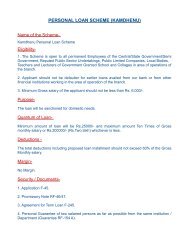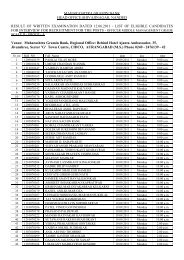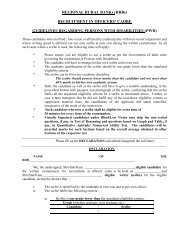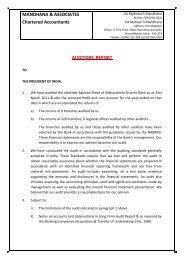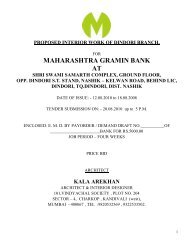BANKING OMBUDSMAN SCHEME - maharashtra gramin bank
BANKING OMBUDSMAN SCHEME - maharashtra gramin bank
BANKING OMBUDSMAN SCHEME - maharashtra gramin bank
You also want an ePaper? Increase the reach of your titles
YUMPU automatically turns print PDFs into web optimized ePapers that Google loves.
<strong>BANKING</strong> <strong>OMBUDSMAN</strong> <strong>SCHEME</strong><br />
============================================<br />
The Banking Ombudsman Scheme enables an expeditious and inexpensive forum to Bank customers<br />
for resolution of complaints relating to certain services rendered by <strong>bank</strong>s. The Banking Ombudsman<br />
Scheme is introduced under Section 35 A of the Banking Regulation Act, 1949.<br />
Salient features of the scheme -<br />
1. The Banking Ombudsman is a senior official appointed by the Reserve Bank of India to redress<br />
customer complaints against deficiency in certain <strong>bank</strong>ing services.<br />
2. As on date, fifteen Banking Ombudsmen have been appointed with their offices located mostly<br />
in state capitals. For Maharashtra & Goa Ombudsman office is situated at Reserve Bank of<br />
India Mumbai Regional Office, Garment House, Ground Floor, Dr. A. B. Road, Worli,<br />
Mumbai. 400 018.<br />
3. All Scheduled Commercial Banks, Regional Rural Banks and Scheduled Primary Co-operative<br />
Banks are covered under the Scheme.<br />
4. Grounds of complaints -<br />
The Banking Ombudsman can receive and consider any complaint relating to the following<br />
deficiency in <strong>bank</strong>ing services (including internet <strong>bank</strong>ing) -<br />
• Non-payment or inordinate delay in the payment or collection of cheques, drafts, bills<br />
etc.;<br />
• Non-acceptance, without sufficient cause, of small denomination notes tendered for any<br />
purpose, and for charging of commission in respect thereof;<br />
• Non-acceptance, without sufficient cause, of coins tendered and for charging of<br />
commission in respect thereof;<br />
• Non-payment or delay in payment of inward remittances ;<br />
• Failure to issue or delay in issue of drafts, pay orders or <strong>bank</strong>ers’ cheques;<br />
• Non-adherence to prescribed working hours ;<br />
• Failure to provide or delay in providing a <strong>bank</strong>ing facility (other than loans and<br />
advances) promised in writing by a <strong>bank</strong> or its direct selling agents;<br />
• Delays, non-credit of proceeds to parties accounts, non-payment of deposit or nonobservance<br />
of the Reserve Bank directives, if any, applicable to rate of interest on<br />
deposits in any savings, current or other account maintained with a Bank ;<br />
• Complaints from Non-Resident Indians having accounts in India in relation to their<br />
remittances from abroad, deposits and other <strong>bank</strong>-related matters;<br />
• Refusal to open deposit accounts without any valid reason for refusal;<br />
• Levying of charges without adequate prior notice to the customer;<br />
• Non-adherence by the <strong>bank</strong> or its subsidiaries to the instructions of Reserve Bank on<br />
ATM/Debit card operations or credit card operations;
• Non-disbursement or delay in disbursement of pension (to the extent the grievance can be<br />
attributed to the action on the part of the <strong>bank</strong> concerned, but not with regard to its<br />
employees);<br />
• Refusal to accept or delay in accepting payment towards taxes, as required by Reserve<br />
Bank/Government;<br />
• Refusal to issue or delay in issuing, or failure to service or delay in servicing or<br />
redemption of Government securities;<br />
• Forced closure of deposit accounts without due notice or without sufficient reason;<br />
• Refusal to close or delay in closing the accounts;<br />
• Non-adherence to the fair practices code as adopted by the <strong>bank</strong> or non-adherence to the<br />
provisions of the Code of Bank’s Commitments to Customers issued by Banking Codes<br />
and Standards Board of India and as adopted by the <strong>bank</strong> ;<br />
• Non-observance of Reserve Bank guidelines on engagement of recovery agents by <strong>bank</strong>s;<br />
and<br />
• Any other matter relating to the violation of the directives issued by the Reserve Bank in<br />
relation to <strong>bank</strong>ing or other services.<br />
A customer can also lodge a complaint on the following grounds of deficiency in service with<br />
respect to loans and advances<br />
• Non-observance of Reserve Bank Directives on interest rates;<br />
• Delays in sanction, disbursement or non-observance of prescribed time schedule for<br />
disposal of loan applications;<br />
• Non-acceptance of application for loans without furnishing valid reasons to the applicant;<br />
and<br />
• Non-adherence to the provisions of the fair practices code for lenders as adopted by the<br />
<strong>bank</strong> or Code of Bank’s Commitment to Customers, as the case may be;<br />
• Non-observance of any other direction or instruction of the Reserve Bank as may be<br />
specified by the Reserve Bank for this purpose from time to time.<br />
• The Banking Ombudsman may also deal with such other matter as may be specified by<br />
the Reserve Bank from time to time.<br />
5. When complaint can be filed <br />
One can file a complaint before the Banking Ombudsman if the reply is not received from the<br />
<strong>bank</strong> within a period of one month after the <strong>bank</strong> concerned has received one s representation,<br />
or the <strong>bank</strong> rejects the complaint, or if the complainant is not satisfied with the reply given by<br />
the <strong>bank</strong><br />
.<br />
6. When complaint not be considered by the Ombudsman <br />
One’s complaint will not be considered if:<br />
a. One has not approached his <strong>bank</strong> for redressal of his grievance first.<br />
b. One has not made the complaint within one year from the date one has received the reply<br />
of the <strong>bank</strong> or if no reply is received if it is more than one year and one month from the date of<br />
representation to the <strong>bank</strong>.
c. The subject matter of the complaint is pending for disposal / has already been dealt with<br />
at any other forum like court of law, consumer court etc.<br />
d. Frivolous or vexatious.<br />
e. The institution complained against is not covered under the scheme.<br />
f. The subject matter of the complaint is not within the ambit of the Banking<br />
Ombudsman.<br />
g. If the complaint is for the same subject matter that was settled through the office of the<br />
Banking Ombudsman in any previous proceedings.<br />
7. Procedure for filing the complaint before the Banking Ombudsman -<br />
One can file a complaint with the Banking Ombudsman simply by writing on a plain paper.<br />
One can also file it online, or by sending an email to the Banking Ombudsman. There is a form<br />
along with details of the scheme in their website. However, it is not necessary to use this<br />
format.<br />
8. Where can one lodge his/her complaint -<br />
One may lodge his/ her complaint at the office of the Banking Ombudsman under whose<br />
jurisdiction, the <strong>bank</strong> branch complained against is situated.<br />
For complaints relating to credit cards and other types of services with centralized operations,<br />
complaints may be filed before the Banking Ombudsman within whose territorial jurisdiction<br />
the billing address of the customer is located.<br />
9. Complaint Can be filed by one s authorized representative -<br />
Yes. The complainant can be filed by one s authorized representative (other than an advocate).<br />
10. Is there any cost involved in filing complaints with Banking Ombudsman -<br />
No. The Banking Ombudsman does not charge any fee for filing and resolving customers’<br />
complaints.<br />
11. Limit on the amount of compensation as specified in an award -<br />
The amount, if any, to be paid by the <strong>bank</strong> to the complainant by way of compensation for any<br />
loss suffered by the complainant is limited to the amount arising directly out of the act or<br />
omission of the <strong>bank</strong> or Rs 10 lakhs, whichever is lower.<br />
12. Compensation can be claimed for mental agony and harassment -<br />
The Banking Ombudsman may award compensation not exceeding Rs 1 lakh to the<br />
complainant only in the case of complaints relating to credit card operations for mental agony<br />
and harassment. The Banking Ombudsman will take into account the loss of the complainant s<br />
time, expenses incurred by the complainant, harassment and mental anguish suffered by the<br />
complainant while passing such award.<br />
13. Details required in the application -<br />
The complaint should have the name and address of the complainant, the name and address of<br />
the branch or office of the <strong>bank</strong> against which the complaint is made, facts giving rise to the<br />
complaint supported by documents, if any, the nature and extent of the loss caused to the<br />
complainant, the relief sought from the Banking Ombudsman and a declaration about the<br />
compliance of conditions which are required to be complied with by the complainant.
The Banking Ombudsman endeavors to promote, through conciliation or mediation, a<br />
settlement of the complaint by agreement between the complaint and the <strong>bank</strong> named in the<br />
complaint. If the terms of settlement (offered by the <strong>bank</strong>) are acceptable to one in full and final<br />
settlement of one s complaint, the Banking Ombudsman will pass an order as per the terms of<br />
settlement which becomes binding on the <strong>bank</strong> and the complainant.<br />
14. Banking Ombudsman can reject a complaint at any stage on following grounds -<br />
The Banking Ombudsman may reject a complaint at any stage if it appears to him that a<br />
complaint made to him is -<br />
• Not on the grounds of complaint referred to above<br />
• Compensation sought from the Banking Ombudsman is beyond Rs 10 lakh.<br />
• Requires consideration of elaborate documentary and oral evidence and the proceedings<br />
before the Banking Ombudsman are not appropriate for adjudication of such complaint<br />
• Without any sufficient cause<br />
• That it is not pursued by the complainant with reasonable diligence<br />
• In the opinion of the Banking Ombudsman there is no loss or damage or inconvenience<br />
caused to the complainant.<br />
15. Settlement of complaints -<br />
If a complaint is not settled by an agreement within a period of one month, the Banking<br />
Ombudsman proceeds further to pass an award. Before passing an award, the Banking<br />
Ombudsman provides reasonable opportunity to the complainant and the <strong>bank</strong>, to present their<br />
case. It is up to the complainant to accept the award in full and final settlement of your<br />
complaint or to reject it.<br />
If one is not satisfied with the decision passed by the Banking Ombudsman, one can approach<br />
the appellate authority against the Banking Ombudsmen’s decision. Appellate Authority is<br />
vested with a Deputy Governor of the RBI. The <strong>bank</strong> also has the option to file an appeal<br />
before the appellate authority under the scheme.<br />
16. Time limit for filing an appeal before appellate authority -<br />
If one is aggrieved by the decision, one may, within 30 days of the date of receipt of the award,<br />
appeal against the award before the appellate authority. The appellate authority may, if he/ she<br />
is satisfied that the applicant had sufficient cause for not making an application for appeal<br />
within time, also allow a further period not exceeding 30 days.<br />
17. How does the appellate authority deal with the appeal -<br />
The appellate authority may -<br />
i. dismiss the appeal; or<br />
ii. allow the appeal and set aside the award; or<br />
iii. send the matter to the Banking Ombudsman for fresh disposal in accordance with such<br />
directions as the appellate authority may consider necessary or proper; or<br />
iv. modify the award and pass such directions as may be necessary to give effect to the<br />
modified award; or<br />
v. pass any other order as it may deem fit.


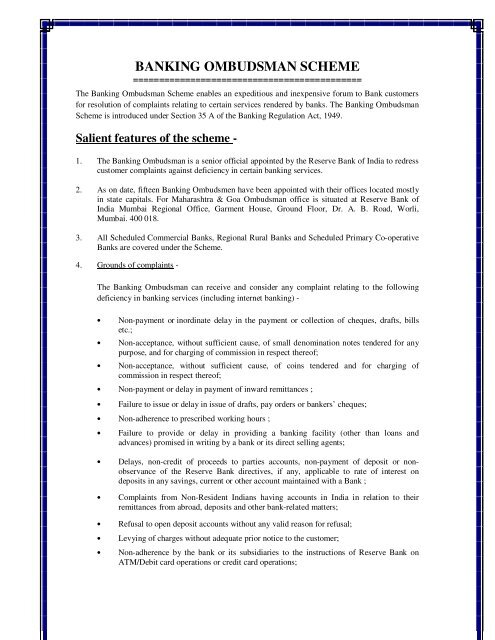
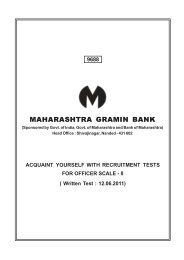
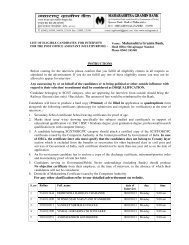
![FORM NO. 31 [See rule 42] Application for a certificate under section ...](https://img.yumpu.com/49987957/1/184x260/form-no-31-see-rule-42-application-for-a-certificate-under-section-.jpg?quality=85)
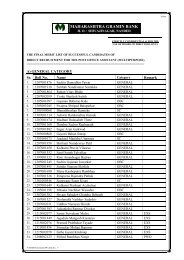
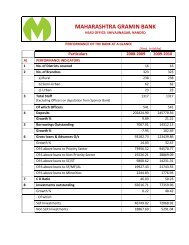
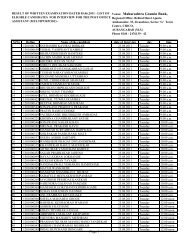
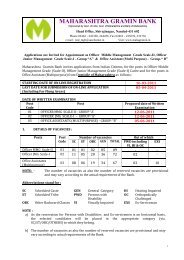
![FORM NO. 15H [See rule 29C(3)] Declaration under section 197A ...](https://img.yumpu.com/45395081/1/184x260/form-no-15h-see-rule-29c3-declaration-under-section-197a-.jpg?quality=85)

